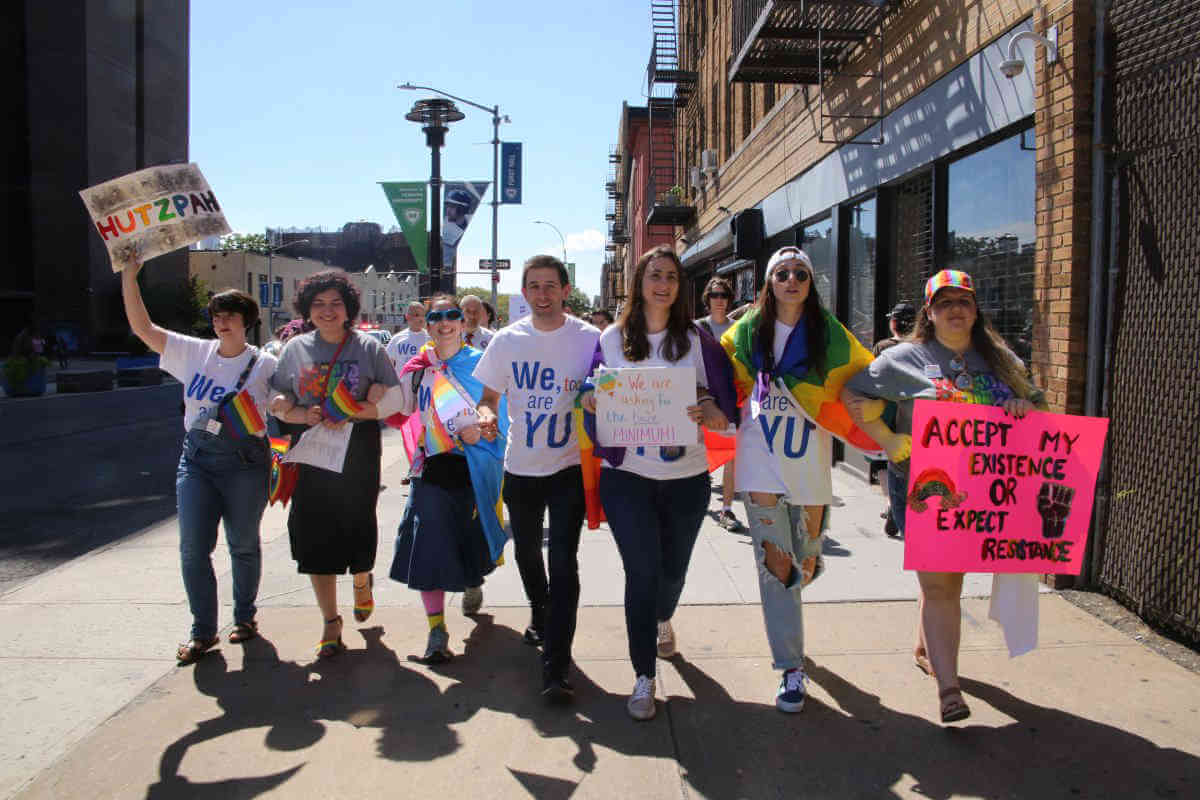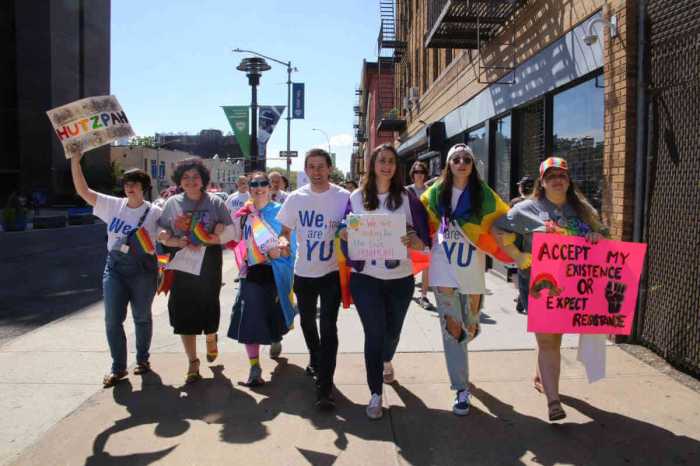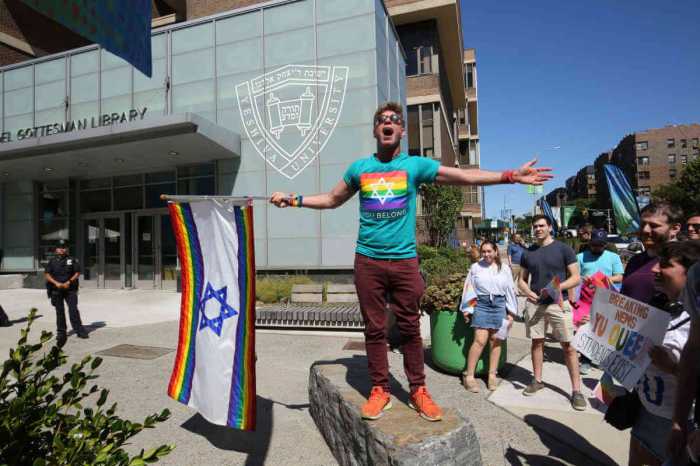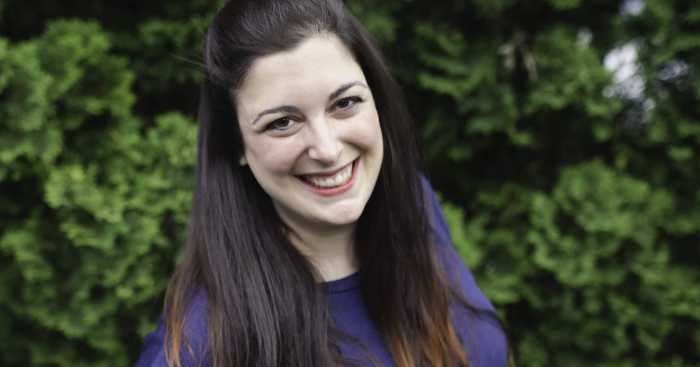A unanimous four-judge panel of the Manhattan-based New York Appellate Division, First Department, ruled against Yeshiva University’s appeal of an order issued in June by New York County Supreme Court Justice Lynn R. Kotler, ordering the university to extend official recognition to YU Pride Alliance, an undergraduate LGBTQ student club, “immediately.” Yeshiva is likely to petition the Court of Appeals for leave to appeal this December 15 ruling, and if it can’t win a reversal there, will likely seek US Supreme Court review.
Justice Kotler found, based on the corporate history of the university, that it did not qualify for an exemption from complying with the New York City Human Rights Law, which forbids discrimination on the basis of sexual orientation and gender identity or expression. A “religious corporation” would be exempted from complying with this, but Yeshiva is incorporated under the New York State Education Law, not the Religious Corporation Law, and Justice Kotler found that its most recent corporate charter makes clear that it is a non-sectarian educational institution, not a religious corporation.
Yeshiva was originally founded as a rabbinical school, but as the university grew and expanded its program into non-religious fields, it eventually spun off the rabbinical school as a separate corporate entity and revised its original charter. The Appellate Division, which issued a decision that does not identify any individual judge as its author, completely agreed with Justice Kotler’s analysis of the Human Rights Law exemption and Yeshiva’s charter.
Yeshiva has long recognized LGBTQ student groups at its graduate schools, but recognizing such a group at the undergraduate college was the sticking point for the university, which claimed that it had consulted rabbinical authorities who advised that it would be contrary to Yeshiva’s character and mission to formally recognize an undergraduate group.
Yeshiva responded to Justice Kotler’s order that it recognize the Pride Alliance “immediately” by seeking a stay pending appeal, which it was denied. It appealed that denial all the way up to the US Supreme Court, arguing that the state court’s order violated Yeshiva’s right to freedom of religion, speech, and association under the First Amendment. The Supreme Court voted 5-4 to deny the stay, finding that Yeshiva had failed to exhaust its state court appellate remedies.
The dissenters from that vote joined an opinion by Justice Samuel Alito contending that Yeshiva was clearly entitled to relief under the First Amendment.
In affirming Justice Kotler’s ruling, the Appellate Division opinion did not mention Alito’s dissenting opinion, agreeing with Justice Kotler that Yeshiva’s First Amendment argument lacks any merit.
“Turning to defendants’ First Amendment arguments, we find that providing the Pride Alliance with full and equal access to public accommodations does not intrude on Yeshiva’s asserted right “to decide matters ‘of faith and doctrine,'” wrote the court. “The record demonstrates that Yeshiva already recognizes LGBTQ+ student organizations at three of its graduate schools, which are legally part of Yeshiva’s corporation, has done so for over 25 years, and made clear as early as 1995 that this recognition did not mean Yeshiva endorsed or accepted the views of those student groups. As such, and in light of Yeshiva’s corporate purpose as an institution of higher education, we find that denial of recognition for the Pride Alliance is not ‘essential’ to Yeshiva’s ‘central mission’”, continued the court, commenting that because the City Human Rights Law’s ban on sexual orientation discrimination in places of public accommodation is a neutral law of general application, its application to Yeshiva is not subject to strict scrutiny and thus can be upheld as having a rational basis.
The court also rejected Yeshiva’s claim that requiring it to recognize the group would violate its rights of free speech and association, quoting a US Supreme Court decision that stated that a “school does not endorse or support student speech that it merely permits on a non-discriminatory basis. Yeshiva has made clear that it does not endorse or accept the views of its already-existing LGBTQ+ student groups, and the City HRL does not require any such endorsement or compel speech. Moreover, there is no violation of Yeshiva’s associational rights where plaintiff Pride Alliance members are already enrolled students.”
The court pointed out that Yeshiva had discussions with representatives of Pride Alliance “about sexual orientation and gender identity issues,” and “Yeshiva continued to express the desire to foster diversity and inclusion in association with Pride Alliance members when denying official recognition.”
When the university failed to obtain a stay of Justice Kotler’s order, it declared that all student club activities on campus would be suspended. Pride Alliance responded by graciously agreeing that no stay was required because it would not insist on recognition until the University’s appeal of Justice Kotler’s ruling was decided. Meanwhile, Yeshiva announced that the University was establishing its own LGBT student group that would be run consistent with Yeshiva’s religious principles, but there was no indication that any LGBTQ students would join such a group.
Because the panel decision is unanimous, the University must petition the Court of Appeals for further review. It is likely that it will do so, and if review is denied, petition the U.S. Supreme Court again. Justice Alito and his three fellow dissenters have enough votes to grant a petition for Supreme Court review, so this story is far from over.
The four members of the Appellate Division panel are Justices Troy C. Webber, Lizbeth Gonzalez, Manuel J. Mendez, and Bahaati Pitt-Burke.
YU Pride Alliance is represented by Emery Celli Brinckerhoff Abady Ward & Maazel, LLP, New York (Katherine Rosenfeld of counsel). The University is represented by the Becket Fund for Religious Liberty, a conservative religious litigation group. The instant notoriety this case attained is shown by the flood of amicus briefs filed with the Appellate Division, which would probably grow even larger were the case to make its way to the Supreme Court, where it seems likely to end up if the University cannot win a reversal at the Court of Appeals.




































